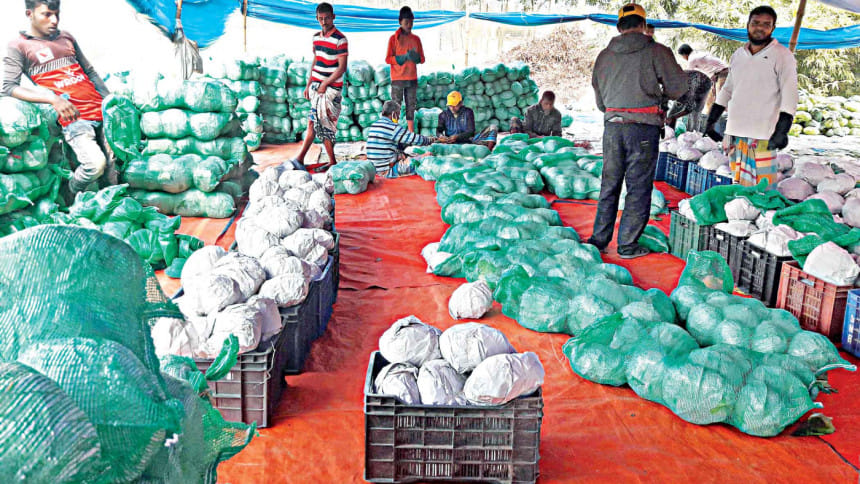Cabbages grown in Jashore make way abroad

Thousands of cabbage farmers in Jashore are getting good prices for their produce thanks to a project called Sustainable Agriculture, Food Security and Linkages (SaFaL).
Solidaridad South and South-East Asia in partnership with the embassy of the Netherlands is implementing the SaFaL programme in the southwest of Bangladesh.
The Dutch NGO, which mainly operates in Narsingdi, has been facilitating cabbage exports to Malaysia and Singapore for the past three years, said Md Raihanul Islam Chowdhury, programme officer for supply chain of Solidaridad Network Asia.
Jagorani Chakra Foundation, a nongovernmental organisation (NGO), is the Jashore partner of the programme, he said.
Under the project, the two NGOs will work to export cabbage between December and February each year.
The farmers can now sell cabbages at the project's collection centres at rates Tk 2 higher than the market price, which used to drop during every harvesting season, Chowdhury said.
The project has been set up alongside the Buribhairab river, located one kilometre away from Satmile bazar and 12 kilometres away from the Jashore municipality.
Ten collection centres have been set up in different areas of the district so that growers can sell their produce without any labour cost.
Eighty labourers work at the collection centres at Tk 500-600 a day and around 20 per cent of them are women, he added.
"Around 9,500 farmers have taken this opportunity since we began the project back in 2018," he added.
As of January 17 this year, the joint venture has exported a total of 123 tonnes of cabbages to Malaysia and Singapore.
They now expect to ship about 500 tonnes by the end of the year.
In 2020, around 76 tonnes of cabbage was exported while it was just 22 tonnes in the year before.
"This is because China occupied the international market that year," Chowdhury said.

In 2018, SaFaL exported 403 tonnes of cabbage and 14 tonnes of other vegetables to Malaysia and Singapore.
On average, 21 tonnes of cabbages are shipped a day. The joint venture also exports other vegetables between February and September.
Rezaul Islam, a farmer based in Haybatpur village, said he cultivated cabbage on 8 bighas of land this year.
Islam sold around Tk 2 lakh worth of the produce so far and expects to sell another Tk 3 lakh worth by the end of February.
"I feel proud that my product is making its way abroad," he added.
Nihari Khatun, a farmer of Sahbajpur village, said she cultivated cabbage on 3 bighas of land this year and has faced no issues in selling her products.
She does not pay any sales tax or carrying cost as she sells it directly to the local collection centre.
In the past, Khatun often incurred huge losses due to dull market prices.
As a result, unsold produce was fed to the cattle.
"But this project changed the situation as they pay us Tk 2 more than the market price," she said.
Labourers Mohammad Ali and Monoara Khatun said the project offers them stable employment for three months at a stretch.
"We are trying to save the farmers through this initiative. We will be happy if they benefit from it," said Md Tohidul Islam, project director of Jagorani Chakra Foundation.
The quality of the cabbage is good, said Md Kazal Bokhtiar, a representative of one of the exporting companies.
"If the quality remains the same, we will be able to export more products from this project."

 For all latest news, follow The Daily Star's Google News channel.
For all latest news, follow The Daily Star's Google News channel. 



Comments